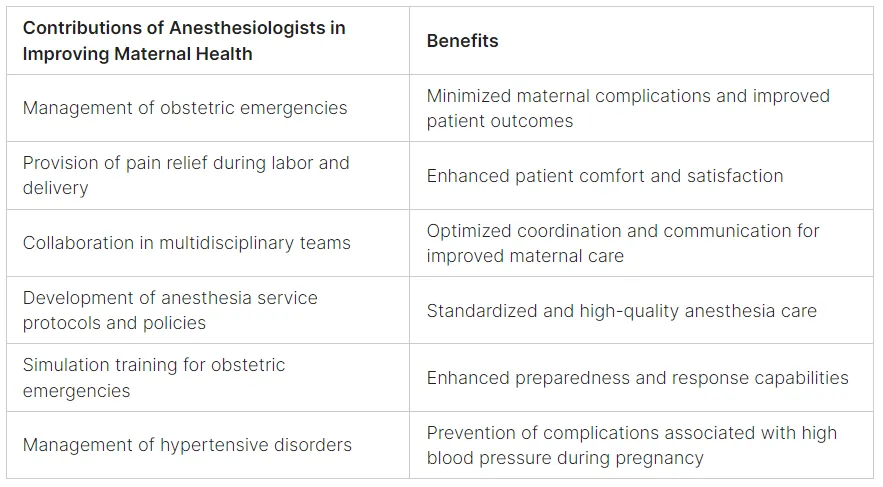How Much Is An Obstetric Anesthesiologist Salary?
Author: Tyesia Hunter
Obstetric Anesthesiologist Salary: Exploring Earnings in Obstetrics and Maternal Care
When it comes to medical specialties, anesthesiology is considered one of the highest-paying fields. If you have an interest in obstetrics and maternal care, becoming an obstetric anesthesiologist can offer you excellent earning potential. In this article, we will delve into the salary prospects of obstetric anesthesiologists and explore the job outlook in this rewarding field.
According to the Medscape Physician Compensation Report 2023, the average salary for obstetricians and gynecologists (OB/GYNs) in the United States is $354,885. While this places OB/GYNs in the middle range of salaries among medical specialties, it's important to note that anesthesiologists, especially those specializing in obstetrics, can often earn higher salaries within this field.
The salary range for OB/GYNs varies, with the 10th percentile earning around $240,000 and the 90th percentile earning around $540,632. Other sources provide slightly different average salary figures, ranging from $236,454 to $300,600. However, the earning potential for anesthesiologists in obstetrics and maternal care is notably higher than these figures, especially for those with specialized expertise and experience.
Key factors that can influence an obstetric anesthesiologist's salary include the demand for their services, their gender, total compensation (including bonuses and profit-sharing contributions), experience level, work location, specific skills, and subspecialty. Higher demand for anesthesiology services, particularly in certain regions, can lead to increased salaries. Additionally, anesthesiologists who have developed specialized skills or subspecialties within obstetrics and maternal care may command higher compensation.
The job outlook for anesthesiologists specializing in obstetrics and maternal care is positive. As the demand for obstetric anesthesia services continues to increase, there is a growing need for skilled professionals who can provide safe and effective care during labor and delivery. This demand, coupled with the potential for higher salaries, makes obstetric anesthesiology an attractive career choice for those interested in this rewarding field.
Key Takeaways:
- Obstetric anesthesiology offers excellent earning potential within the medical field.
- Anesthesiologists specializing in obstetrics and maternal care can earn higher salaries compared to other medical specialties.
- Factors such as demand, gender, total compensation, experience level, work location, skills, and subspecialties can impact an obstetric anesthesiologist's salary.
- The job outlook for anesthesiologists in obstetrics and maternal care is positive, with a growing demand for their services.
- Specialized skills and expertise within obstetric anesthesiology can further enhance earning potential.
Factors Affecting OB/GYN Salary

Anesthesiologists play a crucial role in reducing maternal mortality and morbidity. Their expertise in obstetric anesthesia and involvement in maternal health improvement initiatives contribute significantly to improving the safety and well-being of mothers during pregnancy and childbirth.
During labor and delivery, anesthesiologists provide essential hands-on care and support. They are responsible for managing difficult airways, ensuring adequate pain relief through regional anesthesia techniques, and administering blood products when necessary. These interventions are vital in reducing the risk of complications and ensuring a safe delivery for both the mother and baby.
Anesthesiologists undergo extensive training in perioperative and critical care medicine, making them well-equipped to handle obstetric emergencies and manage underlying maternal diseases. Their specialized knowledge allows them to monitor and mitigate potential complications, such as hypertensive disorders and hemorrhages, during childbirth.
In addition to their clinical expertise, anesthesiologists play a key role in multidisciplinary teams dedicated to improving maternal health and safety. They actively contribute to initiatives such as the Levels of Maternal Care (LOMC) system, which establishes guidelines and standards for the provision of anesthesia services in Level 3 and 4 maternity care facilities. Anesthesiologists also collaborate with organizations like the Alliance for Innovation on Maternal Health (AIM) to develop and implement quality improvement projects aimed at enhancing the overall quality of maternal care.
The involvement of anesthesiologists in maternal health improvement initiatives extends to the designation of Centers of Excellence for Obstetric Care (COE). These centers prioritize the delivery of high-quality obstetric care and further enhance the overall patient experience. Anesthesiologists contribute to the development of anesthesia service protocols, simulation training exercises, and policies aimed at reducing maternal morbidity and achieving optimal outcomes for mothers and babies.
Anesthesiologists' Role in Reducing Maternal Mortality and Morbidity:

[Job Growth Outlook: Obstetric anesthesiologists are projected to grow 13% from 2020 to 2030.]
Their role in reducing maternal mortality and morbidity is further enhanced by their expertise in simulation training and managing hypertensive disorders. Anesthesiologists are actively involved in training healthcare providers to respond to obstetric emergencies through realistic simulation exercises. This training helps improve the overall preparedness of healthcare teams and saves lives during critical situations.
Furthermore, anesthesiologists contribute to the management of hypertensive disorders during pregnancy, a major cause of maternal mortality. Their expertise in monitoring and controlling blood pressure fluctuations is essential in preventing complications associated with conditions like preeclampsia and eclampsia.

The vital contributions of anesthesiologists to maternal care, along with their commitment to improving patient outcomes, make them indispensable members of the healthcare team. Their expertise, dedication, and involvement in initiatives focused on reducing maternal mortality and morbidity play a crucial role in ensuring safer and healthier pregnancies for women.
Related: Tips for Negotiating Anesthesiologist Salary
Job Description of an OB/GYN

Obstetricians and gynecologists (OB/GYNs) specialize in providing women with quality healthcare throughout their lives. They conduct routine check-ups, perform diagnostic tests such as Pap smears and pelvic exams, and offer advice on disease prevention and reproductive health. During pregnancy, delivery, and postpartum, OB/GYNs ensure the health of both the mother and baby. They may perform surgical procedures such as cesarean sections, hysteroscopy, and colposcopy.
OB/GYN job duties include:
- Conducting routine gynecological exams
- Assessing and treating reproductive health issues
- Monitoring pregnancy progress and providing prenatal care
- Performing deliveries, including vaginal births and cesarean sections
- Detecting and managing gynecological diseases and conditions
- Providing family planning services, including contraceptive counseling
- Performing surgical procedures related to the female reproductive system
- Providing menopause management and hormone replacement therapy
Job Outlook and Salary
The job outlook for OB/GYNs is positive, although the growth rate is slower compared to other occupations. The Bureau of Labor Statistics predicts a 2% job growth from 2021-2031, with approximately 400 new jobs expected. The salary for OB/GYNs can vary based on factors such as location, years of experience, type of facility, and employment status (permanent or locum tenens).

Factors such as demand, location, and experience level can impact an OB/GYN's salary. While the average salary for OB/GYNs is $354,885, it can vary significantly depending on individual circumstances.
Related: Regional Variations in Anesthesiologist Salary
Conclusion
In conclusion, the salary of an obstetrician/gynecologist (OB/GYN) in the United States can vary based on several factors. The average salary for an OB/GYN is $354,885, with a salary range of approximately $240,000 to $540,632. It is important to note that factors such as demand, gender, total compensation, experience level, work location, specific skills, and subspecialties can impact an OB/GYN's salary.
Anesthesiologists also play a critical role in improving maternal care. Their expertise in obstetric anesthesia, participation in quality improvement initiatives, and involvement in maternal health organizations contribute to reducing maternal mortality and morbidity. They are key members of multidisciplinary teams working towards better maternal healthcare outcomes.
OB/GYNs have a diverse range of responsibilities, providing comprehensive healthcare for women throughout their lives, with a particular focus on pregnancy and delivery. The job outlook for OB/GYNs is positive, with opportunities available for both permanent positions and locum tenens work. With the increasing demand for their services and the ongoing need for quality maternity care, OB/GYNs can expect to have fulfilling careers in this field.
__________________________________________________________________________________
Consider wanting a long-term position with your specialty. Anesthesiologists are in high demand as permanent hire physicians. Give us a call at 510.335.2265 to learn more or book a consultation call by using the calendar link here.
____________________________________________________________________________________
FAQ
What is the average salary of an obstetric anesthesiologist?
The average salary of an obstetric anesthesiologist can vary depending on factors such as experience, location, and specific skills. However, according to the Medscape Physician Compensation Report 2022, the average salary for anesthesiologists in the United States is $421,000.
How does the salary of an obstetric anesthesiologist compare to other medical specialties?
Anesthesiology is considered one of the highest-paying medical specialties. Obstetric anesthesiologists fall within this category, with the potential for high earning potential.
What factors can influence an obstetric anesthesiologist's salary?
Factors that can influence an obstetric anesthesiologist's salary include experience level, subspecialty skills, geographic location, and the demand for their services.
What is the job outlook for obstetric anesthesiologists?
The job outlook for obstetric anesthesiologists is positive, with an expected increase in demand for their services. This increase in demand may lead to higher salaries in certain regions.
What is the role of anesthesiologists in reducing maternal mortality and morbidity?
Anesthesiologists play a crucial role in reducing maternal mortality and morbidity by providing safe obstetric care, managing difficult airways, and administering necessary interventions during labor and delivery.
What is the job description of an obstetrician/gynecologist (OB/GYN)?
OB/GYNs provide comprehensive healthcare for women throughout their lives, including routine check-ups, diagnostic tests, reproductive health advice, and managing pregnancy, delivery, and postpartum care.
What is the job outlook for OB/GYNs?
The job outlook for OB/GYNs is positive, although the growth rate is slower compared to other occupations. The Bureau of Labor Statistics predicts a 2% job growth from 2021-2031, with approximately 400 new jobs expected.


